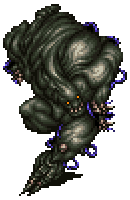Going back a few posts to mention a few things I forgot about:
Next we have the
Harvester. They have a rare steal which is worth getting - Dragoon Boots, which turn the attack command into Jump. The problem is, if you steal from them they will attempt to steal from
you which is incredibly annoying. Sure you can get your stuff back (it's just gil, btw) if you kill them, but it's anxiety inducing.
This has an unintended amusing interaction with the Pixel Remasters, specifically the console version.
As we all know, the console version of the Pixel Remaster has the QoL features of boosting (or reducing, if you so choose) rewards from battle. If the Harvester steals from you, they steal a quantity of gil, which is then folded into the battle rewards if you defeat them before they run away.
So if you choose to boost gil, you can receive up to
four times the amount of gil stolen from you. Given when they stole from me they took like 8k gil, that's 32k gil back, making a 24k gil profit.
Of course, this is a trivial oversight, because if the player really wants that much gil we can just keep the boost to 4x and start grinding like normal (with experience to 0x if we're really worried about levelling too much). It's just weirdly funny to think of these Harvesters as unintentional money-multiplying machines.
I think the Zozoites, when exiled to the margins, found what every exile to the margins in history finds - people were already living there. In this case, giants.
A potential wrinkle in this theory is every structure in Zozo is built to "human" scale, not giant scale. So that would necessarily imply if the Zozoites enslaved the Hill Gigas, they had to get the Gigas to build the city from the ground up, rather than taking over infrastructure that was already there. That would require collecting resources and building materials and metallurgy (for all the rusted girders), which seems like the result of a
full planned expedition with state backing and support, rather than "group of exiles chased out of the city for being poor".
However, I can't think of a reasonable explanation for how Zozo came to be in the first place, infrastructurally. "Enslaved giants did the work" may be a good an explanation as any.
His title isn't even cool! 'Gambler' isn't an inherently cool thing, it's not like 'Wandering Swordsman' or 'Wandering Knight,' Wandering Gambler just sounds like you have a gambling addiction. Which he probably does, seeing as he operates an illicit flying casino!
Something I was pondering was how between Locke, Edgar, and Setzer, we have three of the
very common archetypes for male leads in a certain sort of romance story (which I mostly encounter in shoujo media), from an older (90s) era. And all three archetypes are portrayed positively and desirable, rather than creepy.
The common points are that the three of them are dashing, suave, witty, physically capable, and have a blatant "hint" of danger. All three also share the role of taking the hypothetical female protagonist
away from her life, in a way that doesn't require agency (and thus responsibility) on her part. Locke is the street rogue with a heart of gold, so he knows all the secret tricks and back alleys full of wonder in the female protagonist's own city. Edgar is literal royalty, so he can introduce the female protagonist to the glamourous and glittering world of the aristocracy, while being politically strong enough to protect her from any potential threats. And Setzer is the free spirit who's still urbane and sophisticated enough to show a lady a good time, while not being beholden to any authority other than his own.
So for Setzer, "Gambler" is a title that makes him desirable, because it means he
wins consistently enough, usually through skill. The
possibility of his losing is part of the "thrill of danger", as well as the increasingly higher stakes he might partake in, all of which he would face with assured confidence.
In more modern shoujo romance works, we can see the Locke archetype largely unchanged as the "street rogue", while the Edgar archetype is now often the "black-hearted prince". The Setzer archetype is "mysterious noble ambassador from a faraway country", who notably seldom wins the heart of the female protagonist, and is largely used as a romantic stalking horse.
In all these cases, the assumption in the narrative is the female protagonist
wants to be taken away to another life, Cinderella style, but never actually
expresses this wish, because doing so would, again, imply agency and thus responsibility. So inserting these archetypes into another story, like FFVI between Terra and Celes, makes them strangely out of place and creepy, while still calling upon the archetypes and their attendant narrative assumptions.
I have no idea if FFVI wrote the three men to deliberately adhere to the romance archetypes, or if it's just a coincidence and the writers just picked character types at random.

